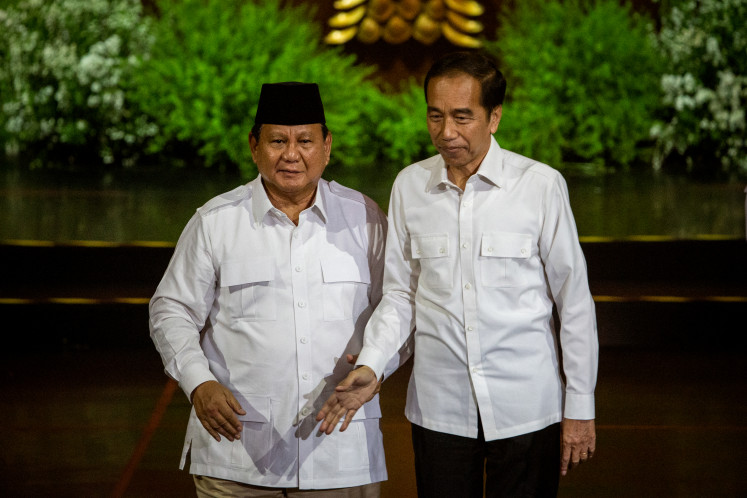Popular Reads
Top Results
Can't find what you're looking for?
View all search resultsPopular Reads
Top Results
Can't find what you're looking for?
View all search resultsCommentary: Journalism not closed-shop profession
Thanks to the internet, everyone with a smartphone/laptop and internet connection, can now call himself a journalist in its wider definition.
Change text size
Gift Premium Articles
to Anyone
O
n World Press Freedom Day on May 3, it may be worth for journalists in Indonesia to reinforce their commitment to fight for freedom — not just their freedom, but also the wider freedom of expression. The struggle must continue, for freedom is something that no one should ever take for granted.
It is therefore disturbing to find the tendency for journalists now to be on the front line in trying to set up more regulations in the name of fighting hoaxes and fake news. The government is only happy to see this and willingly will accept the task to enforce these regulations. This is going against the spirit of why we are celebrating World Press Freedom Day.
Blame it on the internet for creating havoc in the information industry. The proliferation of news and information has brought about massive disruption in society. Every aspect of our lives — political, economic, social, cultural and traditional — is affected. Journalism, a profession closely linked to the information industry, has not been spared.
Thanks to the internet, everyone with a smartphone/laptop and internet connection, can now call himself a journalist in its wider definition: someone who disseminates news and information to the masses, now through the various social media platforms. In the pre-internet era, this was almost an exclusive domain of journalists.
Admittedly, not all of them observe the disciplines, principles as well as ethics that govern the profession. They are not obliged to verify the information before posting it, be fair if not balanced, cover both sides and apply other principles journalists go through. They don’t have to have this sense of public service. Often, they have an agenda — hidden or otherwise.
They are certainly quick and beat professional journalists in their own game, irrespective of the quality of the information. Often, their stories are so outrageous and so unreal that theirs are the ones that go viral, and not stories prepared by the serious journalists.
Feeling threatened, many journalist and media organizations have taken steps to defend their relevance by turning journalism into a closed-shop profession, meaning more regulations.
Initiatives have been proposed to contain the threat of hoaxes and fake news. They range from the verification, registration, accreditation and certification of journalists and media, to organizing standard tests and issuing cards for those who meet the criteria.
For those who had been in this profession since before Indonesia became a democracy in 1998, these initiatives sound very much like measures imposed on journalists and media under the repressive Soeharto regime, then designed to muzzle the press.
While the intention may be noble this time around, their proponents are turning journalism into a profession to the exclusion of others. Like doctors and architects, only those who are so accredited should be allowed to practice the trade; all others should not be trusted.
These measures at any rate could hardly stop or prevent the spread of hoaxes and fake news. You have to go to China to do that, and even there, it is not 100 percent foolproof. But what these actions have done is to announce that these card-carrying, certified and accredited journalists are in a class of their own, with all the rights that come with the profession.
Indonesian journalists already enjoy privileges under the 1999 Press Law, while ordinary people are subject to the Criminal Code (KUHP). The cyberlaw, which contains draconian articles to limit our freedom, is not applied to journalists who would invoke the lex specialis principle.
The campaign to make journalism a closed-shop profession is clearly driven more by self-interests rather than out of a real concern to fight fake news and hoaxes.
The biggest threat to journalism is not coming from non-journalists practicing the trade without observing the principles and ethics; it is coming from journalists and media, many accredited and certified, who are violating the public trust through malpractices. They are some of the worst offenders of disseminating fakes and hoaxes.
They may have shielded themselves through the press law and regulations that make them feel like a special breed of first-class citizens. They fool no one but themselves.
Members of the public care little, and have little time to check whether the stories they read or watch come from accredited sources. They decide whether stories are credible or not, and they form their opinion whether the journalist or media that supplied them can be trusted. No amount of regulation, including certification and registration, can change that.
On World Press Freedom Day, journalists should be thankful for the privileges and freedom the nation accorded them to allow them to work effectively. Instead of making their profession more exclusive, they should fight to ensure everyone enjoys the same privileges and freedoms.
***
The writer, a senior editor of The Jakarta Post, has been a journalist for 35 years.











